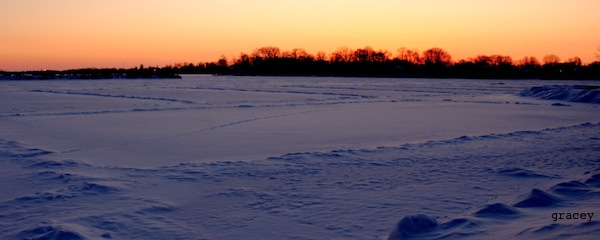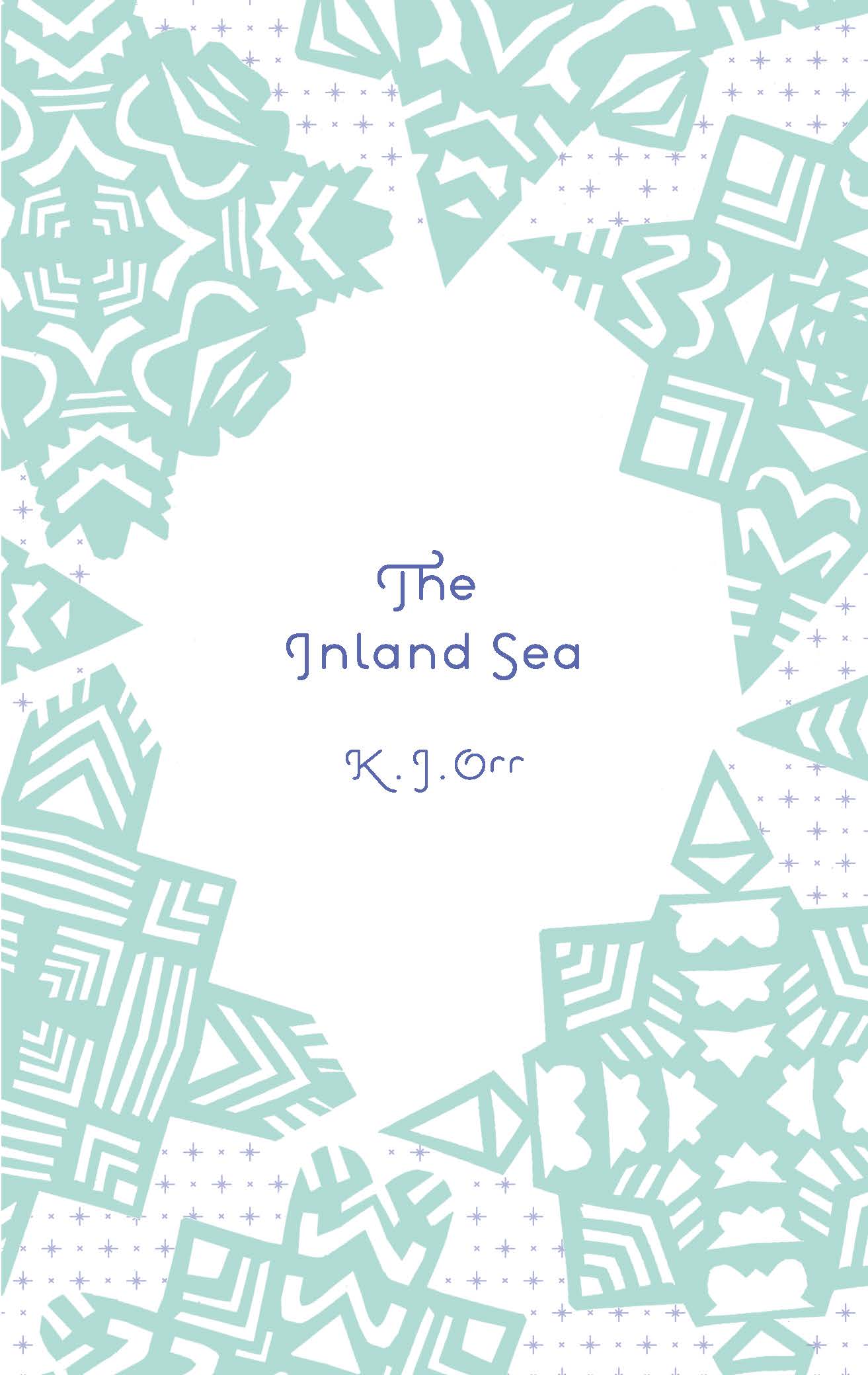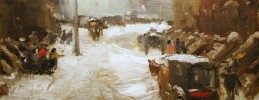
photo by gracey
by Vicki Heath
A Siberian winter, they said. It’s going to be a white Christmas for sure, they promised. These weather reports in October brought out the child in me. As the temperature dropped at the start of December, I dug out my gloves, hat and scarf and prepared myself for the winter chill, with dreams of snowball fights in the street. Then it rained. And we endured a mild, soggy Christmas.
Disappointing, yes, but I still managed to find that almighty big freeze I’d been hoping for: K. J. Orr’s latest offering to the literary world – The Inland Sea. This visually stunning book was published in a limited edition run by Daunt Books, at the start of winter 2012. It is a tale of two boys, Pyotr and Golom, who set out in the early morning to cross a frozen lake close to their home, in Russia. Delicately interwoven through their journey are Pyotr’s thoughts of his father and Dec-Lan, an English geologist who visited their village the summer before. At just 43 pages, it’s one of the shortest books I have ever owned. Yet it’s a truly epic tale of adventure, extreme winter weather and the bonds of brotherhood.
K. J. Orr is a short story writer whose career is rapidly escalating. Her stories have been broadcast on BBC Radio 4 and published by Comma Press, the Bridport Prize, and The Sunday Times Magazine online, to name a few. In 2011 she was shortlisted for the BBC National Short Story Award. Orr is a master of ensuring every word on the page counts – and, for me, it’s her use of simple, beautiful language to conjure vivid and powerful scenes that sets her as a writer to watch.
The Inland Sea opens with images of the dawn – ‘a slash of soft pink’ that separates the hills from the lake – and the chill of the surroundings:
All along the shore line the lake has twisted, churning the ice into contortions which it has thrown up and aside, forming banks of frozen rubble softened only by fresh snowfall.
These striking, intense descriptions of the natural world continue throughout the book, with trees ‘lined up like ghostly battalions, clouding the horizon in layered multitudes’, and the air ‘becomes filmy, taking new form, cascading in gossamer curtains that filter the sunlight, sending it shafting in every direction at once’.
 Throughout the story we learn very little about the appearance of the characters – only something of their clothing, such as Golom’s significant red balaclava, and the ‘chapped skin’ of their father’s hands. And so nature becomes an even stronger focus. It plays a vital role as the elements weave their way through the plot – the weather beginning mild and bright and crisp, and travelling on into mist and hail and blizzards. Pyotr’s memories of the geologist Dec-Lan, who was fascinated by the weather systems of the lake, even turn towards the weather: ‘those storms, he said, that came in and out of nowhere; those hurricanes; those monumental waves’.
Throughout the story we learn very little about the appearance of the characters – only something of their clothing, such as Golom’s significant red balaclava, and the ‘chapped skin’ of their father’s hands. And so nature becomes an even stronger focus. It plays a vital role as the elements weave their way through the plot – the weather beginning mild and bright and crisp, and travelling on into mist and hail and blizzards. Pyotr’s memories of the geologist Dec-Lan, who was fascinated by the weather systems of the lake, even turn towards the weather: ‘those storms, he said, that came in and out of nowhere; those hurricanes; those monumental waves’.
As a writer, The Inland Sea forces me to consider the ways in which I use weather conditions in my own stories. Many writers often overlook the power of natural forces, but, by conjuring such strong, physical scenes of winter, Orr’s writing truly takes you into the world of the story. So much so that when I finished the book and looked out of my window, I was convinced that the white clouds in the sky indicated it was actually going to snow (despite the 8 degree temperature outside).
The tale, as I mentioned, is interspersed with Pyotr’s thoughts of his ship-repairing father, and Dec-Lan the geologist. These two men are worlds apart, and yet it’s Pyotr’s need to impress them both that drives the boys’ adventure.
Orr introduces us to the father abruptly; as the boys set out across the ice Pyotr thinks, ‘He would not be watching them’. At this stage, we don’t know why his father won’t be watching, but this clever introduction to the character gives a sense of apathy on the father’s part. Soon we discover that he is a hard man to impress and that impressing him is Pyotr’s goal.
Golom cannot wait to tell their father of their feat. However, Pyotr has reservations that characterise his relationship with his father. First, Pyotr believes that ‘When he found out, his father probably wouldn’t even be impressed’. And later he suggests that they don’t tell their father of their accomplishment at all. When Golom questions this idea, Pyotr replies, “So someone else would. It’d be better that way. He’d be really impressed because we hadn’t even mentioned it ourselves”.
In contrast, Orr’s introduction of the character Dec-Lan is far warmer. Pyotr thinks fondly of this foreigner who carried out experiments in their lake, and we see a young boy’s admiration come through the story from the beginning:
“You’re-all-right,” Dec-Lan had said in English. This was something he said a good bit, “You’re-all-right.” Pyotr couldn’t be sure what it meant, but he liked the sound, the way the words came out.
As they walk, both Pyotr and Golom talk in the way Dec-Lan did – Golom saying “Jay-sus” when his brother gets too bossy, and Pyotr repeating under his breath “I am a geologist, with a sideline in marine biology”. It is also Dec-Lan’s words that have spurred their mission: ‘“If we’re going to do this hike across your lake,” he said with a wink, “we’d better do it soon.”’
 We’re taken a long way into the story before we discover any kind of warmth from the father – he is a silent man who doesn’t talk to Dec-Lan when he takes him out on his boat, and who ignores his son when he takes him to work in the yard. The boys’ mother died seven years earlier, and Pyotr’s fonder memories of his father are from a time when she was alive. When Pyotr was younger, his father would ‘play act some forest creature, straining his arms towards him, gnashing his teeth’. Maybe it is because the father is a man of so few words that Pyotr is filled with the need to impress him, or perhaps it is his role as a single parent that makes him sterner than he once used to be. Either way, Orr does an incredible job of creating two utterly contrasting adult males, both of which Pytor holds in great esteem.
We’re taken a long way into the story before we discover any kind of warmth from the father – he is a silent man who doesn’t talk to Dec-Lan when he takes him out on his boat, and who ignores his son when he takes him to work in the yard. The boys’ mother died seven years earlier, and Pyotr’s fonder memories of his father are from a time when she was alive. When Pyotr was younger, his father would ‘play act some forest creature, straining his arms towards him, gnashing his teeth’. Maybe it is because the father is a man of so few words that Pyotr is filled with the need to impress him, or perhaps it is his role as a single parent that makes him sterner than he once used to be. Either way, Orr does an incredible job of creating two utterly contrasting adult males, both of which Pytor holds in great esteem.
Pyotr may show more admiration towards Dec-Lan, but his characteristics are more sullen like his father – he too is of few words and he has an inherent, fatherly need to protect his younger brother. Like their appearances, the boys ages are never mentioned in the book, but Orr presents a clear picture that Pyotr is the elder and likes to think of himself as grown-up. She does this simply – Pyotr tells his brother off for catching snowflakes on his tongue, he teases Golom by saying that he is ‘too young to understand’, he continually looks out for him, checking to see if he has had enough food, or if he is tired, and he tries to talk to Golom in the way a weary adult might:
“What have we got to eat?” Golom asks.
[…] “You’d know if you’d packed the bag,” Pyotr says. “You’d know if you were the one carrying it.”
Though these examples largely sum-up Pyotr’s character, Orr balances this by showing a more innocent side to him, as the boys lie on their bellies, hollering into a hole in the ice. His admiration of Dec-Lan also aids his childlike qualities:
He had imagined Dec-Lan standing on the deck of the boat looking out. Pyotr would wave. He couldn’t see anyone waving back, but doing it made him still feel connected to the man.
Touching pictures such as these create a startling contrast to Pyotr’s serious manner. They show the admiration and delight of a young boy, and we’re reminded that he is just a child too – something that could be forgotten by the end of the book. I won’t give the ending of The Inland Sea away, because this is a book that should be savoured by every reader. But what I will say is this: Orr has created a show of love, of bravery and of what it is to be a brother. And she most certainly delivers on the promise of that cold, hard, Siberian winter.


Thanks, Dora. It’s wonderful to see that this review can help you with your story writing. I too am striving for that ‘perfect’ story and I think K.J. Orr can teach us all a great deal about the craft. Good luck with your writing!
Thank you Vicki. I really enjoyed this review. I’m still working on crafting a “perfect” story and reviews like these help me see what I’m missing and what I can do to make it better. There are so many elements that go into making a memorable story, as you’ve noted above. I can only equate it to having a secret language that once acquired, will always be available to the writer – I hope so anyway! At any rate, it sounds like the “Inland Sea” has all those elements and it’s a definite “must” read for me.
Congratulations K.J. and much continued success.